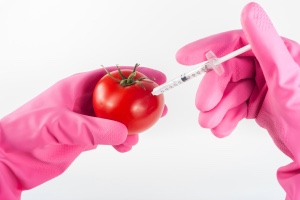
New Delhi: Fresh from its over a year long agitation that forced the Central Government withdraw the three controversial farm laws, the Bharatiya Kisan Union (BKU) is again on the warpath, and summarily rejected the draft regulations by the Food Safety and Standards Authority of India (FSSAI) on Genetically Modified (GM) foods.
In a letter to the FSSAI Chief Executive Officer Arun Singhal, BKU leader Rakesh Tikait said instead of GM technology in the food and farming system, the farmers want prohibition of GM food.
The letter drafted on January 26, 2022 and made available to the media today, takes strong objection to the regulations being proposed by FSSAI to bring in “unsafe and unwanted GMOs [Genetically Modified Organisms] and GM foods into India”.
The BKU recalled that farmer unions and other citizen groups as well as state governments had earlier ensured that no GM food crops are allowed to be cultivated in India, and that risky field trials are stopped.
The BKU further listed its key points of feedback in the letter and claimed that the format that FSSAI prescribed for feedback was a way of keeping out fundamental objections to regulations like these.
Following are the key points mentioned in the BKU letter:
“1. The weak regulations allow for backdoor entry of GMOs:The draft regulations proposed by the FSSAI arecertainly inadequate to ensure food safety. Basing decisions in India on approvals given elsewhere is a complete mockery of theregulator’s responsibility to evolve regulation as per our own needs and requirements. The draft regulations have no mention of any independent and long term impact studies, that too in a comprehensive fashion. No market surveillance mechanisms have been proposed, nor is it clear who will be taking decisions and with whose interests kept in mind. Labeling mechanisms don’t uphold a consumer’s right to know and right to informed choices. Importantly, state governments are not given a veto role, among many other shortcomings. Such regulations will easily allow GM foods to come into India and this seems to be the sole purpose for which regulations have been proposed in this manner. Meanwhile, what we actually require are strong regulations and their implementation, embedded in the precautionary principle, which is at the core of the Cartagena Protocol on Biosafety that India is a signatory to. The precautionary principle should urge us to indefinitely ban the production, import, and sale of GMOs in India given the grave dangers of such a technology.
“2. FSSAI’strack record on food safety is concerning: Over the past years we have seen how FSSAI has not fulfilled its responsibility of being a regulator of food safety and instead has acted as a promoter of GM foods and food industry’s profits in general. This, despite the clear and scientific evidence of GMOs harms tohealth, environment, and farm livelihoods. For instance, FSSAI had set up a scientific panel in which members have a serious conflict of interest, with GM propagandists and promoters brought in. We have also learned that the recent draft regulationson GMOs introduced by the FSSAI were first taken to the industry for feedback and only later opened for comment bycitizens. We find that this is a serious breach of its mandate and we cannot trust that the FSSAI will protect our health and food safety.
3. India does not need GMOs and has rejected them: We are aware of the scientific evidence on the health, environment, and economic risks posed by GM technology. This is why, GMOs have been rejected by India’s citizens, led by farmer unions such as ours, as we saw in the case of both Bt Brinjal and HT Mustard. Most of our state governments have also rejected GM technology.
For farmers, the threat of corporate capture of our food systemsis too great. We see GM foods as a ploy by the biotech industry, especially when we have successfully managed to stall the commercial cultivation permission for GM crops in India. We have countless alternatives to GMOs in the form of indigenous crop varieties and farming practices that together are able to outperform GMOs without any of the associated risks. In the case of processed food too we have innumerable alternatives present in India and so there is no requirement for us to import such products.”
The BKU concluded its letter by reiterating its demand for a prohibition of GM foods, and for FSSAI to enforce the same, and regulations created for that purpose.
Read the letter here.
– global bihari bureau





